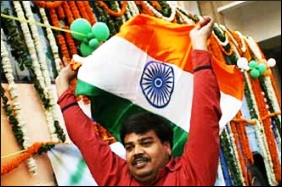|

|
India's growth to rise to 6.2 pc in 2014: IMF
|
|

|
|
| Top Stories |
 |
|
|
|
Arun Kumar | 17 Apr, 2013
Lowering India's growth projections by just a notch, the the
International Monetary Fund (IMF) Tuesday predicted that this will rise
to 5.75 percent in 2013 and 6.2 percent in 2014.
IMF's latest
World Economic Outlook (WEO) released here Tuesday attributes the
projected rise in India's growth to improved external demand and
recently implemented pro-growth measures.
The new projections
however, are 0.2 percentage points lower than those for for 2013 and 0.1
percentage points lower than those for 2014 in IMF's January update of
the WEO
Significant structural challenges will also likely lower
potential output in India over the medium term and also keep inflation
elevated by regional standards, it said.
Projecting global
growth at 3.3 percent in 2013, up to 4 percent in 2014, the IMF said the
global economy is expected to continue mending gradually with
developing, emerging economies persisting in leading global growth.
But
with old dangers remaining and new risks emerging, policymakers cannot
afford to relax their efforts, it warned, noting recovery was uneven in
advanced economies with private demand in the United States improving
faster than in the Euro area.
In emerging markets and developing
economies, fiscal policy is expected to remain close to neutral, the IMF
said as elevated growth will push debt ratios farther down to 30
percent of GDP by 2018.
However, some countries continue to face
significant fiscal challenges, it said, citing the example of Middle
Eastern oil importers with high energy subsidy spending, several
emerging European economies and India.
Activity in emerging
markets has been strong but less so than projected during the past
couple of years, the IMF said. While cyclical factors have played a
role, so have permanent shocks - markdowns to medium-term output have
now reached almost 4 percent since the September 2011 WEO.
Policymakers
must carefully consider the risks of policies falling behind the curve
and becoming pro-cyclical, which would amplify rather than modulate the
cycle, the IMF said voicing a concern that too much of the recent
downturn is attributed to cyclical rather than structural factors.
In
countries like India, Brazil and Russia, for instance, supply factors,
such as infrastructure or labour market bottlenecks, and domestic
policy factors, such as policy uncertainty and regulatory obstacles,
have contributed to the recent stalling of investment, it said.
In
Asia, growth has already returned to a healthy pace in China. External
demand, solid consumption, a better monsoon season, and policy
improvements are expected to lift activity in India too, IMF said.
|
|
|
| |
|
|
|
|
|
|
|
|
|
|
|
|
|
|
| |
| Customs Exchange Rates |
| Currency |
Import |
Export |
US Dollar
|
84.35
|
82.60 |
UK Pound
|
106.35
|
102.90 |
Euro
|
92.50
|
89.35 |
| Japanese
Yen |
55.05 |
53.40 |
| As on 12 Oct, 2024 |
|
|
| Daily Poll |
 |
 |
| Do you think Indian businesses will be negatively affected by Trump's America First Policy? |
|
|
|
|
|
| Commented Stories |
 |
|
|
|
|
|
| |
|